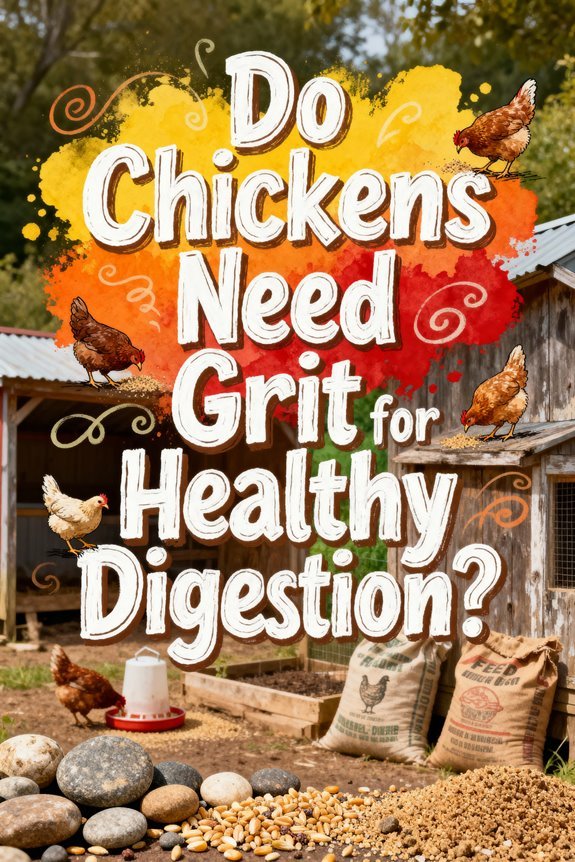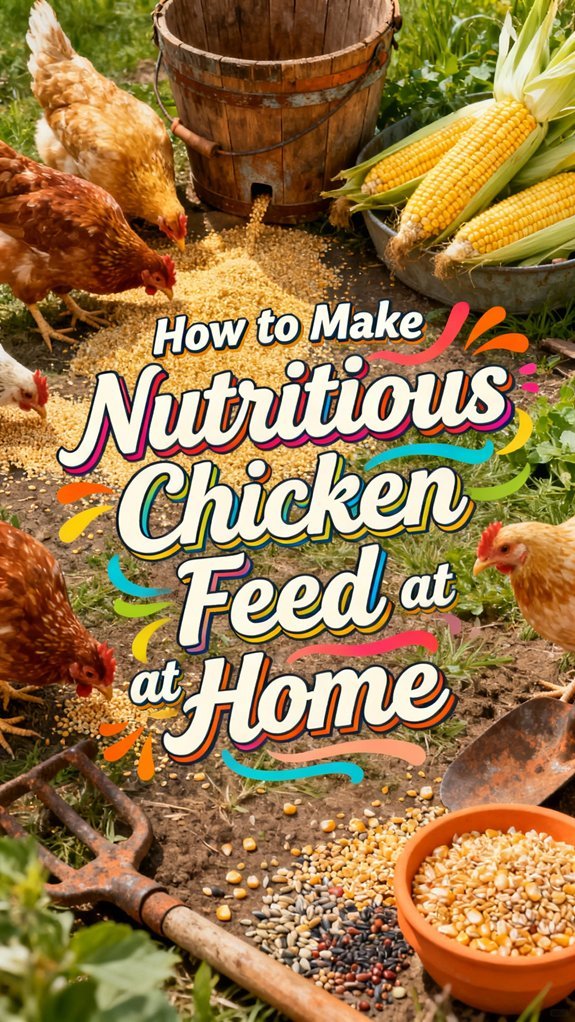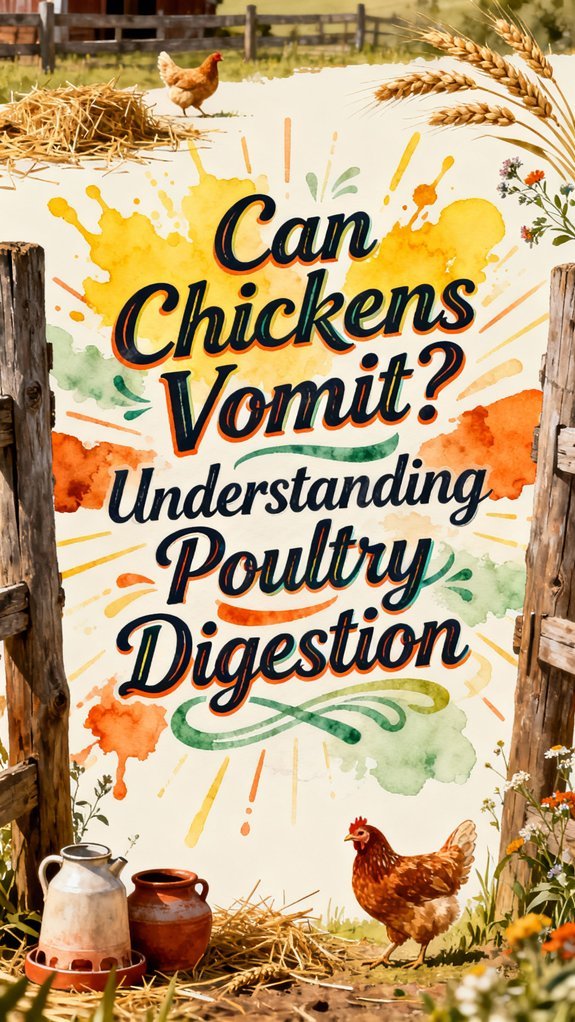You should never feed coffee grounds to chickens as they contain dangerous levels of caffeine that can be toxic to poultry. Caffeine disrupts their metabolic processes, potentially causing seizures, organ failure, and death. While coffee grounds aren’t safe as feed, you can use them in other beneficial ways around your coop – like as bedding material or pest control. Understanding the safe applications of coffee grounds can enhance your chicken-keeping practices.
The Hidden Dangers of Coffee Grounds for Chickens
While coffee grounds may seem like an eco-friendly way to recycle kitchen waste, they pose significant health risks to chickens due to their caffeine content and other toxic compounds. When your chickens ingest coffee grounds, they’re exposed to dangerous levels of caffeine that can trigger severe health issues, including restlessness, seizures, and potential organ failure. The caffeine effects on poultry health can be devastating, leading to growth defects and death in extreme cases. A 1944 study demonstrated that chickens fed diets containing coffee supplements experienced significant growth stunting.
Beyond caffeine, you’ll need to take into account the high nitrogen content and acidic nature of coffee grounds, which can damage your chickens’ liver and kidneys. If you notice symptoms like rapid heart rate, panting, or vomiting in your flock after exposure to coffee grounds, seek immediate veterinary care to prevent irreversible damage or fatal outcomes.
Understanding Caffeine Toxicity in Poultry
To effectively protect your chickens from caffeine toxicity, you’ll need to understand how this compound affects their bodies at a molecular level. Caffeine’s methylxanthine properties trigger the release of catecholamines like epinephrine and dopamine, disrupting normal metabolic processes in poultry health.
When your chickens consume caffeine, they’ll experience increased energy consumption and lipid oxidation, leading to potential energy deficits. The effects on poultry health are dose-dependent, with symptoms including ataxia, muscular tremors, and rapid abdominal respiration. You’ll notice signs like restlessness, agitation, and rapid heart rate in affected birds. High caffeine levels can significantly impact egg production quality and increase mortality rates, particularly at concentrations of 450 ppm or higher. The compound also weakens their immune system, making them more susceptible to infections. Similar to how chocolate and candy contain harmful compounds that can poison chickens, caffeinated products pose serious risks to your flock’s health. Studies show that hens consuming caffeine experienced significant reductions in body weight gain across all treatment groups compared to control birds. Instead, focus on providing proper commercial feeds formulated with balanced nutrients like corn, soy, and amino acids that support healthy growth and egg production.
Safe Alternatives for Using Coffee Grounds in Your Coop
Since coffee grounds pose risks when consumed by chickens, their safe application in the coop environment focuses on bedding and pest control alternatives. You’ll find dried coffee grounds offer a sustainable bedding option that’s both lightweight and dust-free. For ideal bedding texture, consider blending grounds with pine shavings to enhance absorption and manageability.
Coffee grounds excel in pest prevention without chemical pesticides, naturally repelling parasites and insects while controlling odors that attract flies. You’ll need to keep the grounds dry and scoop them daily to maintain sanitation. While they’re not suitable as feed, they’ll serve your flock well as an eco-friendly bedding choice. The grounds won’t stain your chickens’ feet or eggs, and they’re fully compostable when it’s time for replacement. Instead of coffee grounds, focus on providing quality layer feed that contains the proper protein and calcium levels your hens need for health and egg production. After cleaning out the coop, used grounds can be mixed into garden soil for additional fertilizing benefits.
Best Practices for Coffee Ground Management Around Chickens
Managing coffee grounds around chickens requires strict protocols to guarantee flock safety and minimize health risks. You’ll need to focus on proper coffee ground storage, keeping grounds in sealed containers away from your flock’s direct access. If you’re using grounds as bedding, opt for decaffeinated varieties from commercial sources to reduce toxicity concerns.
Chickens consuming high amounts of coffee grounds could suffer liver and kidney damage due to excessive nitrogen exposure. Never feed coffee grounds directly to your chickens, as they’re toxic and can cause severe health issues. If you’re incorporating minimal amounts in compost, maintain strict feeding frequency limits and always dilute grounds with other materials. Keep waterers elevated and separate from any bedding containing grounds to prevent contamination. You’ll also want to monitor coop humidity levels closely, as coffee grounds retain moisture differently than traditional bedding materials. Day-old chicks are especially vulnerable to toxins since they cannot regulate their body temperature and require specialized care with proper nutrition. Instead, consider offering wholesome ingredients like oats, sunflower seeds, and grains as safe, nutritious alternatives that support chicken health and well-being.
Environmental Benefits and Sustainable Applications
While coffee grounds pose risks when fed directly to chickens, their environmental applications offer significant sustainable benefits for your poultry operation. By incorporating spent grounds into your compost, you’ll enhance soil fertility, improve moisture retention, and boost microbial activity. These sustainable practices create a nutrient-rich environment that benefits both your garden and chicken areas. Local coffee shops are often happy to provide free used grounds for your sustainable poultry operation.
The compost benefits extend beyond soil enhancement. You’ll reduce landfill waste, decrease methane emissions, and create a circular resource system on your property. Coffee grounds’ natural pest-repellent properties help deter harmful insects while attracting beneficial earthworms. When used as coop bedding, they’ll absorb moisture and neutralize odors, particularly ammonia from droppings. This multipurpose waste product supports environmentally conscious poultry keeping while minimizing your dependence on synthetic inputs and chemical controls.




